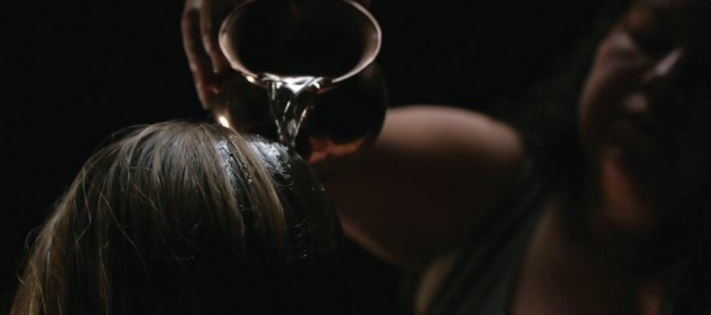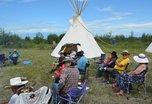Moving Forward, Never Forgetting - Encouraging intercultural dialogue and empathy through art

Related Programs

Moving Forward, Never Forgetting aims to encourage intercultural dialogue between Indigenous and non-Indigenous peoples through the transformative power of art, according to the exhibition’s co-curators David Garneau and Michelle LaVallee.
Moving Forward, Never Forgetting, which runs from February 28 to April 19, 2015, features new artwork and performances, works from the MacKenzie’s permanent collection, public workshops, and residencies with artists Cheryl L’Hirondelle, Adrian Stimson and Peter Morin. Additionally, the exhibition’s artworks and performances will be accompanied by living speakers. “We’re calling them Story Keepers,” Michelle LaVallee, co-curator, explains. “Their job will be to talk to visitors about the work and the exhibition.”
The exhibition is only one aspect of the project. Besides the static work in the gallery and the three significant performances, a space will be set up where people will make art or do beading and other activities. David Garneau, co-curator, adds that within that space, there will be opportunities for public dialogue. “On a human level, there will be many things that viewers will be able to engage with.”
Garneau, associate professor and head of visual art, University of Regina, is Métis, while LaVallee, who has curated at MAG for seven years, and explores colonial relations through her exhibitions, is Ojibway. Both hope the exhibition provides a space to stimulate conversation about issues surrounding personal experiences in public schools, out-of-culture adoption, land loss, language loss and residential schools.
LaVallee, however, cautions that these themes are not the exhibit’s central focus. “The exhibition is more about the broader experience of colonization on the lives of First Nations and Métis peoples in the area, and we want to create a deeper understanding of what it means to co-reside in these territories as Indigenous and non-Indigenous people,” she says. Garneau adds, “We’re also emphasizing intercultural aspects within the exhibit. For instance, language loss is a poignant issue for Indigenous people, but there will also be immigrant people who will talk about that tension.”
"I find that people are interested in talking about these things, but they don't have a safe venue, and art can help to ease it in."
Garneau also explains that art can provide a safe entry point into discussions about difficult cultural topics, such as racism. “It’s very difficult to talk face-to-face about these issues, but if two people are sitting side by side and looking at a third object that is mysterious and creative, art can become an entry point into these conversations,” he says. “I find that people are interested in talking about these things, but they don’t have a safe venue, and art can help to ease it in.”
LaVallee and Garneau say they aim to attract a broad audience, and according to Leah Brodie, director of marketing, MAG, that shouldn’t be difficult. “Gallery attendance is on the rise,” she says. “Last year we welcomed more than 53,000 gallery visitors, and we have already welcomed nearly 64,000 with three months remaining in our current fiscal year.”



